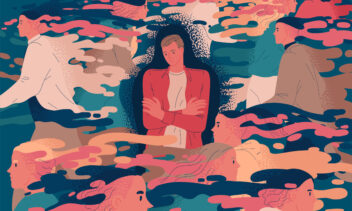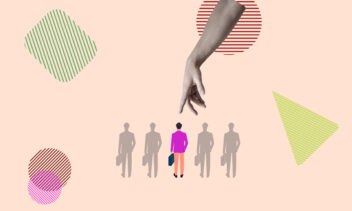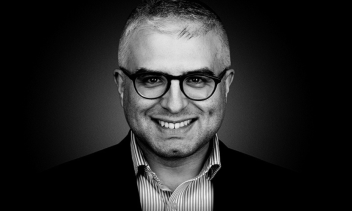Recent research has challenged the common assumption that there is a Shidduch Crisis raging rampant among our Orthodox emerging adults. Whether or not the Shidduch Crisis is as dire as we once supposed, I believe, is the less important question. Our work to heal the deep-seated, systemic issues surrounding dating and marriage in the Orthodox world remains the same.
That Orthodox men and women struggle to get married through a smooth (dare we say enjoyable?) and timely process is inarguable. I recently participated in a mixed-methods research study by the Orthodox Union that surveyed 2,3000 single Orthodox men and women and interviewed nearly 100 single men and women, shadchanim, and community leaders. It demonstrated that there are, in fact, two distinct crises within the Orthodox world.
The Crisis of Process reflects the fact that most men and women feel helpless in finding others to date, relying almost exclusively on others—whether shadchanim, friends, or family—to suggest potential partners. Both men and women lack serious confidence in the effectiveness of those routes in leading to marriage. They desire more direct access to “shayach” (relevant) dates and more ownership and control over their own dating process.
The Crisis of Experience reflects the fact that single people, most notably those in their late-20s and beyond, report feeling blamed or judged by their Orthodox communities and struggle to participate in Orthodox life. While at times they feel invisible and infantilized, they almost ubiquitously feel that they do not have a place to belong, nor a way to contribute meaningfully, to their communities.
The stakes of these two crises are incredibly salient and hold true whether or not the majority of single, Orthodox Jews can expect to be married by their 30s or 40s. The Crisis of Process negatively impacts the capacity of single people to successfully find one another, marry, and begin a family when they so desire, while the Crisis of Experience significantly detracts from Orthodox Jews’ quality of life while they are single. And as every person will spend at least some time single and dating—whether two months or 20 years—these combined crises have a direct impact on the lives of every Orthodox young adult to some degree. Finding a positive resolution to these communal dilemmas will create more healthy relationships for single people with one another and with other communal members.
The good news is that there is much we can do to alleviate the systemic issues that are causing the Crisis of Process and the Crisis of Experience. The OU’s research points to five areas that would require improvement to achieve marked societal change as relates to the Shidduch Crisis.
I. Increased Ownership Over the Dating Process
Current Reality: Single, Orthodox Jews have little direct access to appropriate potential matches. Instead, they must rely on third parties to think of and suggest dates. Yet these third-party “Finders” (whether shadchanim, websites, rabbis, or friends) have no accountability to the single men and women. Single men and women are left feeling “a little like Rapunzel waiting for someone else to send the prince along,” as one woman put it. Overall, single people desire more ownership and access to matches for themselves.
Solution: Create ways in which single people can access one another without the need to rely on third-party “Finders.”
Ideas from the Research: Participants advocated for the proliferation of informal, organic meeting places for single people. Some suggested shul events geared towards single people, and others suggested informal networks of events. Others recommended the use of technology – such as websites that use simple algorithms to match partners or apps that help match up contacts in people’s phones – to allow for more direct access to one another, without the need for “intermediaries”.
II. Places for Belonging & Contribution
Current Reality: By and large, single men and women feel that although they are often professionally or academically successful, they are marginalized and disenfranchised from their Orthodox communities. They feel that shuls and communal institutions disallow their input or leadership while they are single, do not have relevant events or programs for them, and are built on the assumption that the adults that the shuls serve are ubiquitously married. Single men and women desire a change in how singlehood is perceived, and how single people are treated, within Orthodox communities.
Solution: Find ways to establish belonging for single people as valued members of the community, especially in shuls and communal institutions.
Ideas from the Research: Participants spoke about wanting community members to speak welcomingly to them and invite them to meals, shuls hosting singles events, Rabbis and community leaders taking a more active role in mentorship, and communal institutions inviting and welcoming their contributions.
III. Education and Mentorship
Current Reality: Many single men and women desire to have a sensitive relationship with a mentor during this time of life that is filled with decisions that directly impact their life trajectories. They also report wishing that they had better, relevant education about relationships and other issues directly applicable to their dating lives.
Solution: Provide both mentorship and relevant education relating to adult singlehood.
Ideas from the Research: Participants wanted their communities to provide mentors or dating coaches at affordable costs. They asked for workshops from their shuls and community institutions about dating, marriage, and personal development.
IV. Improvements to the Current Matchmaking System
Current Reality: Single men and women and shadchanim had vastly different perspectives on the “shidduch crisis”. Single men and women, overall, highly dislike using shadchanim, and they tend to feel that shadchanim’s advice is demeaning or offensive, while the suggestions are often off-base or insulting. For their part, when interviewed, shadchanim related genuinely trying to help single men and women find a spouse, and feel that their guidance is needed. Shadchanim also feel unfairly compensated for their time and that there are unreasonable demands made on them by the community.
Solution: Find a way in which shadchanim can become effective forces for good in the community, enabling better and healthier relationships while being fairly compensated.
Ideas from the Research: Participants suggested regulated training for shadchanim who want to act as coaches, as well as creating a platform for ethical oversight. They also suggested communal norms that controlled the number of matches suggested at one time. Shadchanim suggested formal rules of compensation for successful matches.
V. Better Socialization of Men
Current Reality: The OU’s study implies that there are fewer available men in the Orthodox dating market than women. It theorizes that men are leaving Orthodoxy at a higher rate than women and showed that, generally, men do not possess the social status nor religious sentiments desired by women.
Solution: Pinpoint the reasons behind male attrition and social misalignment, and work to nurture and foster the growth and maturation of young men.
Ideas from the Research: Participants felt that both men and women were held to unrealistically high standards, and suggested training and educational programs around topics such as menschlichkeit, dating etiquette, and financial responsibility, especially for men.
Where That Leaves Us
There are two distinct crises facing our community that together make up the “Shidduch Crisis”: the Crisis of Process, and the Crisis of Experience. These crises necessitate five approaches to change in our communities: (1) Develop direct access for singles to one another; (2) create spaces for single people to belong and contribute; (3) provide mentors and educators needed for self and relational development; (4) improve issues in the matchmaking system as much as possible; and (5) work to counter attrition by supporting the development of young men.
While I presented some ideas of how these five approaches might be addressed, I critically assume that the public conscience has more and better collective ideas. Detailed proposals that enumerate specific methods to address any of these five communal needs should be encouraged, drawn up, and duly considered by well-meaning philanthropists. The success of any attempted solution should be evaluated through data collection, and the model spread if successful. It is, at the very least, what we owe our young people and our communities.
Channah Cohen has held several positions in the OU, including an Applied Researcher for the Center for Communal Research, a Project Manager for the Department of Community Projects and Partnerships, and a Torah Educator for the Jewish Learning Initiative on Campus. Channah majored in Psychology at Yeshiva University’s Stern College for Women, and was chosen for the Murray Adler Leadership and Vision Award. She completed a master’s degree in Adult Learning & Leadership at Teachers College, Columbia University, and is studying coaching at the School of Positive Transformation. Channah is interested in the intersection of religious education and psychology, and strives to learn and teach means of spiritual living that are resonant with the human experience. She lives in Silver Spring, MD with her husband and three children.








